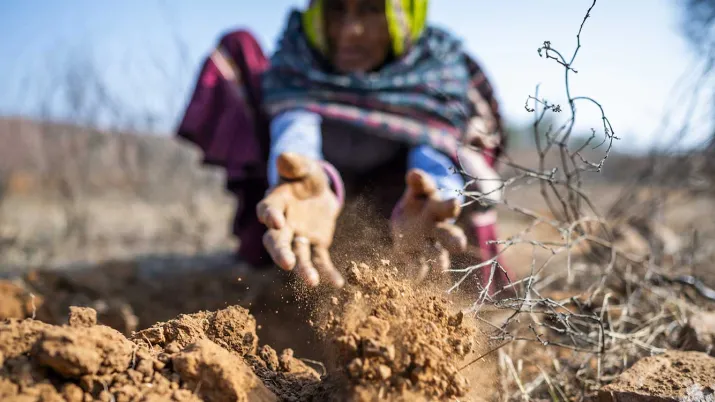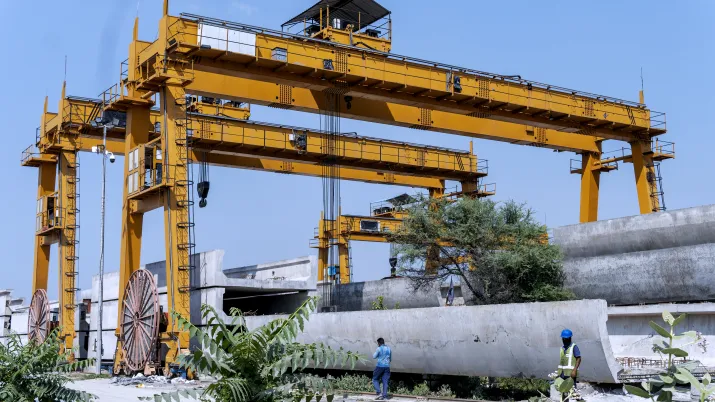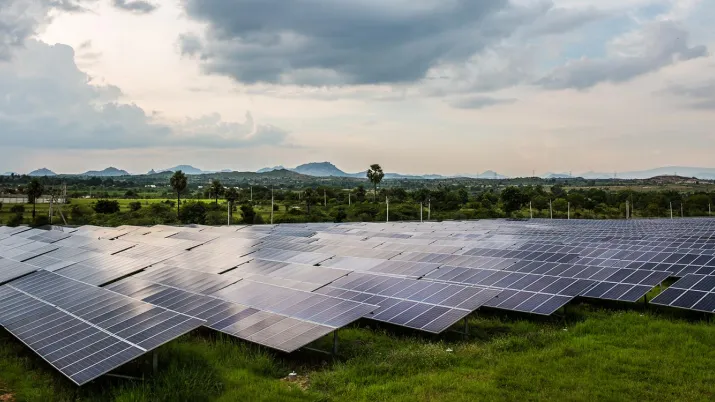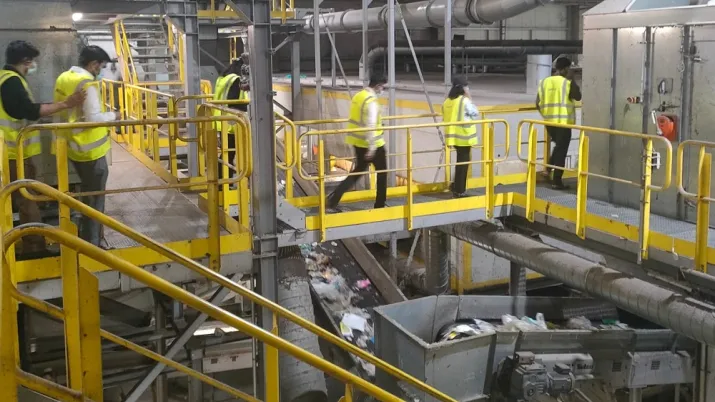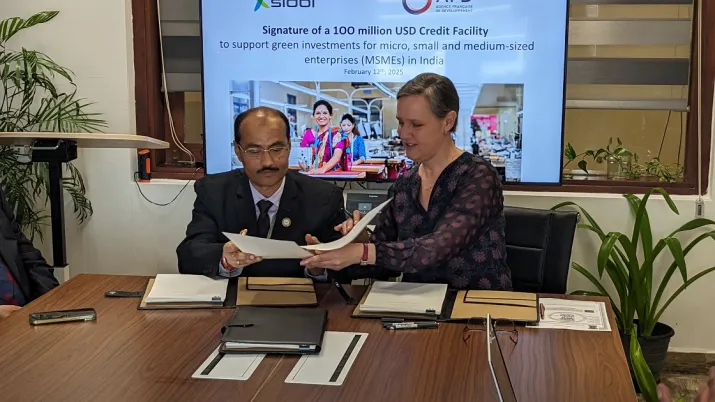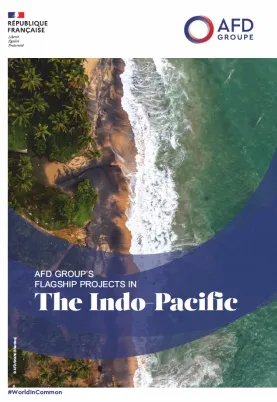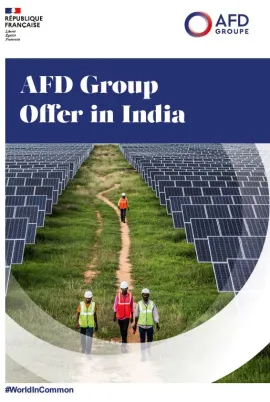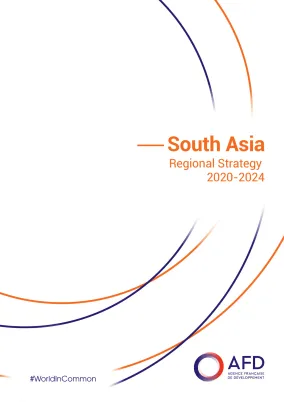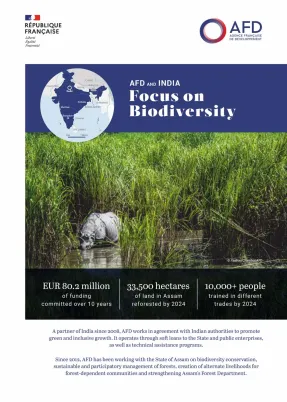Share the page
India
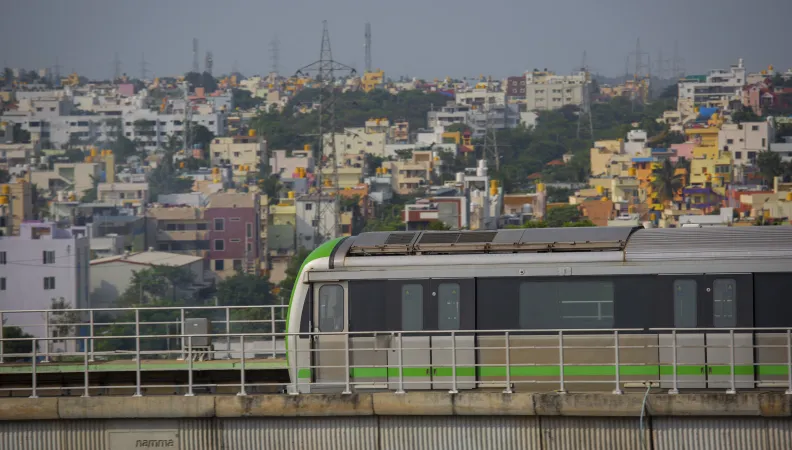
India: 1.4 billion inhabitants and record-breaking economic performance. While striving to improve the quality of life of its population and develop its infrastructure, the country is pursuing a proactive climate policy, making adaptation and resilience to climate change a major priority. Since 2008, AFD has been supporting India in implementing a resilient, inclusive, and low-carbon development pathway that aligns with both international climate priorities and those of the Indo-Pacific region.
Context
With its 1.4 billion inhabitants, India is the most populous country in the world. Ranked as the fifth-largest economic power, it holds a strategic position on the international stage, both financially and politically, and plays a crucial role in shaping the planet’s climate trajectory.
However, India faces a number of significant challenges. On one hand, the government has adopted ambitious investment programs to address the “classic” challenges of an emerging economy: ensuring universal access to basic services, bridging the infrastructure gap, meeting the growing demand for energy, and creating jobs.
On the other hand, climate change compels national stakeholders to act on both mitigation and adaptation fronts, in a context where the country is simultaneously one of the largest greenhouse gas emitters and one of the most vulnerable to its impacts. India is increasingly exposed to extreme events such as heatwaves, droughts, floods, cyclones, and other intensifying climate-related hazards.
Despite massive investments in renewable energy and electric vehicles, India’s transition toward carbon neutrality – targeted for 2070 – remains a significant challenge. The ability of its territories to build resilience will be a decisive factor in shaping the country’s future development.
Our approach
AFD and India : supporting a low-carbon, inclusive and resilient development trajectory
As the world’s third-largest energy consumer and second-largest importer of fossil fuels, India plays a pivotal role in shaping global energy demand. Driven by a combination of factors—including population growth, urbanization, economic expansion, industrialization, the adoption of electric vehicles, and the intensifying heatwaves caused by climate change—India’s energy demand is set to continue rising in the coming decades. However, the country’s energy consumption still relies heavily on coal.
In this context, India is pursuing a strategy aimed at meeting its growing energy needs and ensuring energy security, while also committing to a transition toward decarbonization. At COP26, the government set the ambitious goal of achieving carbon neutrality by 2070.
To achieve this, India is investing heavily in renewable energy, which already accounts for 45% of the country’s installed power capacity. The target of 50% non-fossil energy, set during previous COP summits, is therefore now within reach. At the same time, India is actively exploring hydrogen and nuclear energy as alternative sources.
Looking ahead, India will revise its Nationally Determined Contribution (NDC) in 2025, with plans to invest further in energy storage and modernizing power grids, to better optimize its production capacity.
AFD supports India’s energy transition by:
- Directly financing hydroelectric projects in the State of Himachal Pradesh.
- Partnering with leading Indian public banks such as the Indian Renewable Energy Development Agency (IREDA) and the State Bank of India (SBI) to fund projects developed by private operators in renewable energy and electric mobility, while also providing technical assistance. Through the GIFS platform (Greening the Indian Financing System), co-funded by the European Union, AFD promotes knowledge-sharing and best practices on the role of public banks in supporting India’s energy transition.
Promoting energy efficiency, for example by working with Energy Efficiency Services Limited (EESL) to implement more efficient public lighting solutions, and with the Small Industries Development Bank of India (SIDBI) to facilitate access to credit for SMEs investing in energy-saving technologies.
India’s urban population is projected to grow from 35% today to 50% by 2050, presenting both significant opportunities and considerable challenges. Extensive efforts and investments are underway to ensure access to essential urban services, including transport, energy, housing, water, sanitation, and solid waste management.
More than half of AFD’s portfolio in India is dedicated to financing sustainable urban development, supporting the creation of inclusive, livable, and low-carbon cities. Among its flagship initiatives, AFD is funding metro lines in six Indian cities – Bangalore, Kochi, Nagpur, Pune, Surat, and Ahmedabad – four of which are already operational. These infrastructures are expected to improve residents’ quality of life significantly, driving major benefits in urban productivity, air quality, and carbon footprint reduction.
AFD is also working to promote the sustainable management of water resources and to improve access to water and sanitation services. We are collaborating with the cities of Chandigarh, Jodhpur, and Pondicherry, as well as five secondary cities in Himachal Pradesh, to address rising demand and enhance water quality.
Finally, in partnership with the European Union, AFD supports the CITIIS programs (City Investments to Innovate, Integrate and Sustain), which aim to introduce innovation into large-scale national investment programs. CITIIS 1.0, aligned with the Smart City initiative, funded 11 pilot projects across Indian cities in sectors such as urban mobility, public spaces, housing, and governance, leveraging French and European expertise. Building on this success, CITIIS 2.0 focuses on solid waste management and will provide funding and technical support to 18 cities, with a strong emphasis on innovation and cross-sectoral knowledge sharing.
India’s urban population is projected to grow from 35% today to 50% by 2050, presenting both significant opportunities and considerable challenges. Extensive efforts and investments are underway to ensure access to essential urban services, including transport, energy, housing, water, sanitation, and solid waste management.
More than half of AFD’s portfolio in India is dedicated to financing sustainable urban development, supporting the creation of inclusive, livable, and low-carbon cities. Among its flagship initiatives, AFD is funding metro lines in six Indian cities – Bangalore, Kochi, Nagpur, Pune, Surat, and Ahmedabad – four of which are already operational. These infrastructures are expected to improve residents’ quality of life significantly, driving major benefits in urban productivity, air quality, and carbon footprint reduction.
AFD is also working to promote the sustainable management of water resources and to improve access to water and sanitation services. We are collaborating with the cities of Chandigarh, Jodhpur, and Pondicherry, as well as five secondary cities in Himachal Pradesh, to address rising demand and enhance water quality.
Finally, in partnership with the European Union, AFD supports the CITIIS programs (City Investments to Innovate, Integrate and Sustain), which aim to introduce innovation into large-scale national investment programs. CITIIS 1.0, aligned with the Smart City initiative, funded 11 pilot projects across Indian cities in sectors such as urban mobility, public spaces, housing, and governance, leveraging French and European expertise. Building on this success, CITIIS 2.0 focuses on solid waste management and will provide funding and technical support to 18 cities, with a strong emphasis on innovation and cross-sectoral knowledge sharing.
India is home to some of the most extraordinary natural riches on the planet. Three of the world’s thirty-six biodiversity hotspots, as defined by Conservation International, are located there: the Western Ghats, the Himalayas, and Indo-Burma. Although the country has a solid legislative framework for conservation, this unique natural heritage is under severe pressure from human activity, compounded by the effects of climate change, which are weakening ecosystems and disrupting natural cycles.
Since 2012, AFD has been actively supporting the state of Assam in the northeast of the country and, since 2022, the state of Rajasthan, in the proactive implementation of sustainable and participatory forest management policies. These large-scale projects cover not only the reforestation of degraded areas but also the promotion of sustainable forest management practices, involving local communities directly in conservation efforts. These initiatives focus on protecting wildlife species, raising awareness about the importance of preserving natural heritage, and addressing the complex relationship between biodiversity and climate. They also work on mitigating human-wildlife conflict and creating alternative livelihood opportunities for communities that live in and depend on forests.
India is also highly vulnerable to the effects of climate change. In a country where temperatures can reach close to 50°C at the peak of summer, the consequences of global warming could be catastrophic by the end of the century, with increased rainfall variability, more frequent droughts, severe floods, and stronger cyclones. Rising sea levels could affect more than 200 million people living along India’s coastal areas and contribute to soil salinization. The increasing frequency of extreme weather events directly threatens human lives.
AFD supports the efforts of the states of Kerala in the south and Himachal Pradesh in the north to strengthen the resilience of their territories: urban planning that integrates flood risks, the establishment of early warning systems, the reinforcement of road infrastructure to prevent landslides, better coordination for upstream preparation, and improved emergency response to disasters such as forest fires, among others.
AFD also supports the fisheries and aquaculture sector, which accounts for 1.1% of the country’s GDP and provides direct employment to 28 million people. Since 2024, AFD, in collaboration with the World Bank, has been supporting the Department of Fisheries (DoF) of the Government of India in a project aimed at strengthening the resilience and efficiency of the fisheries and aquaculture sector. This project seeks to further formalize the sector, improve access to credit and insurance for stakeholders, and encourage investments in building a more efficient value chain, while enhancing the quality and safety of fishery products and promoting the sustainable management of resources.
Beyond its “Climate and Global Public Goods” mandate in India, AFD is committed to fostering reciprocal exchanges of expertise between India and France. This is reflected in several initiatives:
- Conducting studies that leverage French expertise to support the implementation of loans;
- Organizing training programs and study tours in France to better understand the French and European ecosystems, and in some cases extending to other countries, such as within the framework of the Indo-Pacific Natural Parks Partnership, which compares management models from India, France, and South Africa;
- Creating platforms for exchange between stakeholders. For example, the Indo-European GIFS (Greening the Indian Financial System) platform, developed in close collaboration with the Shakti Sustainable Energy Foundation (SSEF) and the Small Industries Development Bank of India (SIDBI), facilitates knowledge sharing and training between French and Indian financial sector stakeholders (banks, investment funds, and regulators), as well as with public organizations (specialized operators, local authorities).
In the field
Find the country's projects, news, publications, and contact details below.
On the field
News & press releases
Strengthening biodiversity cooperation between India and Southern Africa
Published on November 26, 2025
From Delhi to Paris: India on the path to resilient urban waste management
Published on July 25, 2025
Publications & media
Key figures
-
48 projects financed since 2008
-
3.1 billion euros committed
-
3 million people gaining access to improved sustainable mobility
-
1 million people gaining improved access to water

